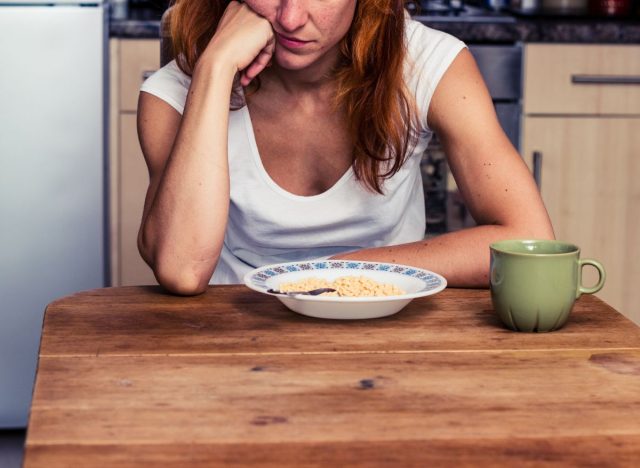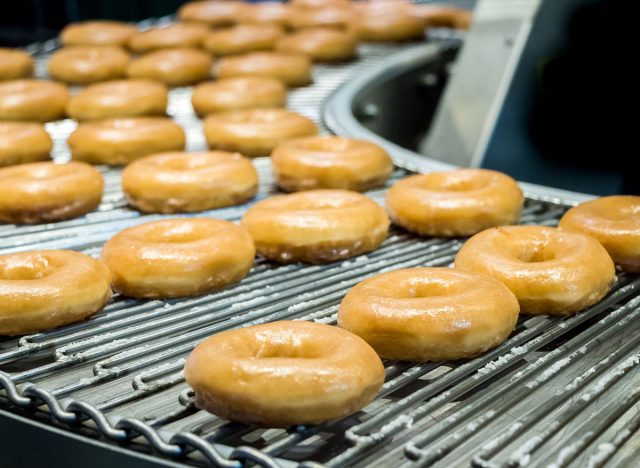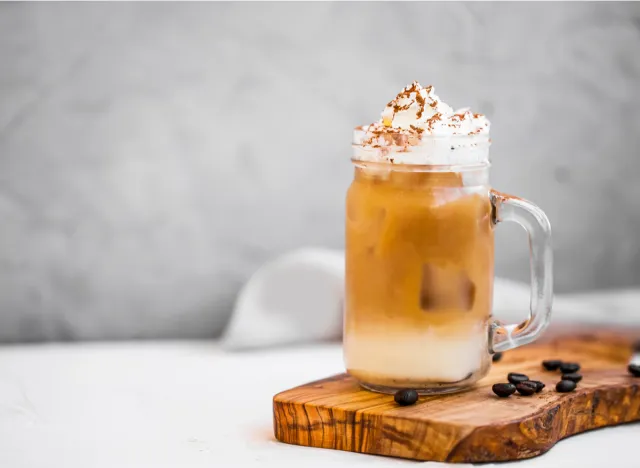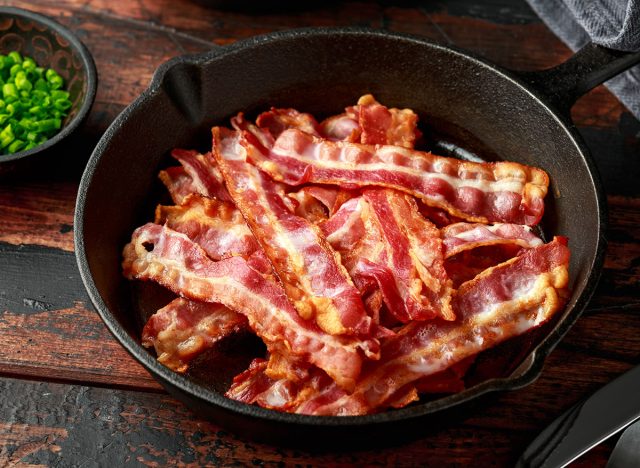It may be a good idea to limit the fancy coffee drinks and amount of processed meat you consume.

Inflammation is a tricky medical condition. On the one hand, it is a necessary process that our bodies need to heal from injury, which is known as acute inflammation. On the other hand, chronic inflammation can lead to serious health issues and illness when left unaddressed. Causes of chronic inflammation autoimmune disorders, exposure to toxins, obesity, and an inactive lifestyle. According to Harvard Health, it also “plays a central role” in diseases like diabetes, heart disease, certain cancers, and Alzheimer’s.
Because of inflammation’s connection to weight, diet, and exercise, there are certain foods that we can eat and avoid to help lower our chances of developing chronic inflammation in the long run. While it may feel overwhelming to make a ton of changes at once, it may be helpful to start with just one part of your day: your morning routine. Breakfast is an important meal and one with plenty of opportunities for healthy doses of protein, fiber, and other helpful nutrients. However, your breakfast routine may also be causing you inflammation-related issues that you aren’t yet aware of.
Continue reading to learn about some of the worst breakfast foods and breakfast habits for inflammation, and for more healthy eating tips, make sure to check out Popular Foods For Reducing Inflammation After 50.
1Regularly skipping breakfast

When it comes to finding breakfast habits that can help you reduce and manage inflammation, a great place to start is making sure you’re eating breakfast in general. Crazy mornings and busy schedules make it tempting to skip the meal and just take your coffee on the go, but research shows there may be a connection between inflammation and skipping breakfast on a consistent basis.
A study published in Public Health Nutrition found that habitually skipping breakfast could lead to higher concentrations of CRP, which is a C-reactive protein and common marker of inflammation in the body. These findings were more significant in older adults than in younger populations.
Skipping breakfast had an effect on those with a poorer diet quality, but it did not seem to have a significant impact on those with better diet quality. In other words, if you’re already eating an unbalanced diet and missing many key nutrients, skipping breakfast may exacerbate this impact on your inflammation and health.
2Eating refined carbohydrates

When it comes to inflammation, added sugar and refined carbohydrates are some of the leading culprits.
“One of the worst breakfast habits for inflammation is eating refined carbohydrates and foods high in added sugar like packaged pastries, donuts, and baked goods,” says Amy Goodson, MS, RD, CSSD, LD, a member of our medical expert board and author of The Sports Nutrition Playbook.
Lauren Manaker, MS, RDN, registered dietitian on our medical expert board and author of The First Time Mom’s Pregnancy Cookbook and Fueling Male Fertility agrees.
“Sugary and refined pastries like donuts and muffins can be loaded with ingredients that can contribute to inflammation, so it’s best to stick to whole grain options without questionable ingredients instead,” Manaker says.
3Drinking sugar-sweetened beverages

Sometimes enjoying sugar-sweetened drinks in the morning, like fancy coffee drinks or juices with added sugar, can lead to inflammation or other unwanted health problems.
“Some research suggests that excessive sugar intake may encourage the growth of inflammatory gut bacteria that can increase your risk of obesity and inflammatory bowel disease,” says Goodson. “Plus, simple sugars can contribute to blood sugar spikes and drops, leading to roller coaster-like blood sugar and energy levels over the course of the morning, and even the whole day.”
A meta-analysis published in Nutrients found that heavier sugar consumption, especially when consumed in the form of a sugary beverage, was linked with more of the C-reactive proteins, AKA the inflammatory markers in the body. One study also found that people who lowered their intake of sugar had fewer of these inflammatory markers.
4Adding too much sugar to your morning coffee

Even if you aren’t pulling through the Starbucks drive-through for a PSL, your morning cup of coffee may still lead to some unwanted inflammation if you’re in the habit of adding a good amount of sugar.
“Coffee can be a healthy addition to a breakfast plate, depending on what is added to your cup of Joe,” says Manaker. “Adding spoonfuls of sugar, while tasty, isn’t the best choice when trying to manage chronic inflammation.”
Many different studies support the fact that sugar is a major culprit in causing unwanted inflammation. A report published in Frontiers of Nutrition states that sugar is not only a major factor in chronic inflammation, but is also linked to things such as diabetes, cardiovascular disease, and metabolic syndrome.
If you love sugar in your coffee, you don’t need to get rid of it for good. This is simply a reminder to watch how much you’re consuming if inflammation is a concern of yours. If sugary coffee is a habit you’re not wanting to ditch, try finding other dietary areas throughout the day where you can limit your sugar intake.
5Eating breakfast foods with artificial trans fats

Goodson also mentions that foods made with a lot of trans fats may cause inflammation and may have negative effects on your cholesterol and heart health.
“These foods, like fried fast food breakfast, treats, pastries, baked goods made with margarine or vegetable shortenings, and certain nondairy coffee creamers can be identified by having hydrogenated or partially hydrogenated oils on the food’s ingredient list,” says Goodson.
6Eating bacon, sausage, or other processed meats

Manaker warns about regularly eating certain processed breakfast meats, like sausage or bacon, which some studies have found can lead to higher concentrations of inflammatory markers like CRP.
“These foods are linked to the development of chronic inflammation,” says Manaker. “And while eating these foods once in a while is likely fine, eating them every day isn’t the best habit to get into.”
If you’re worried about inflammation in your body, your next best step is to talk with your doctor or dietitian about some of these regular habits you may have. Our hope is that you don’t feel pressure to eliminate every single one of these habits from your life, but that you instead have a road map of where you can start in reducing inflammation in your body.
Source: https://www.eatthis.com








